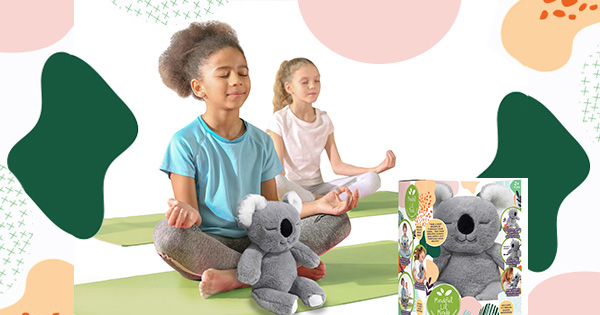This week, we’re joined by Flair, who have been introducing their latest must-have toy – the Mindful Lil Minds Breathing Meditation Buddy. Designed to look like a cuddly koala bear, this toy helps to guide children through a five-minute guided meditation, whilst its belly expands and retracts to help teach children how to breathe mindfully. You can find out more about this brilliant toy here. But first, we wanted to explore what mindfulness is and how it can benefit people of all ages…
What is Mindfulness?
Mindfulness, according to the NHS website, is an awareness practice that involves paying more attention to the present moment – that’s what your thinking, feeling, and how your body is behaving and feeling in that moment, and it’s also awareness of what’s going on in the world around you. It’s about knowing what is going on inside and outside of ourselves, moment by moment.
Mindfulness is promoted by the Mental Health Foundation, NICE, the UK’s National Institute for Health and Care Excellence, and other key bodies. It’s becoming an increasingly popular form of meditation, and can be practised using techniques like breathing exercises, yoga, mindful colouring, and more. For more ideas on how you can practise mindfulness with your children, check out our on-site feature here.
Why we all need to develop coping mechanisms for dealing with stress & anxiety
From an early age, mindfulness can help minimise anxiety and increase happiness.
Stress and anxiety can affect us all. Common causes in childhood include academic pressure, big changes within the family, bullying, busy schedules, scary books/movies and more! And, as adults, well, we probably don’t need to go into too much depth, but life gets ever more complicated!
For this reason, it’s important that we ALL develop ways that help us to manage those stressful events, and establishing these coping mechanisms in childhood is ideal, as habits formed early in life will inform behaviours in adulthood.
How can Mindfulness benefit you and your family?
Studies have shown that mindfulness can have a positive effect on decreasing anxiety and increasing cognitive performance. It’s understood that by becoming more aware, through mindfulness practice, people learn to better manage their thoughts, so as not to become overwhelmed by them.
Professor Mark Williams, former director of the Oxford Mindfulness Centre, who is quoted on the NHS website, has a simple way of explaining the benefits of mindfulness:
“Mindfulness allows us to become more aware of the stream of thoughts and feelings that we experience and to see how we can become entangled in that stream in ways that are not helpful. This lets us stand back from our thoughts and start to see their patterns. Gradually, we can train ourselves to notice when our thoughts are taking over and realise that thoughts are simply ‘mental events’ that do not have to control us.
“Most of us have issues that we find hard to let go and mindfulness can help us deal with them more productively. We can ask: ‘Is trying to solve this by brooding about it helpful, or am I just getting caught up in my thoughts?’ Awareness of this kind also helps us notice signs of stress or anxiety earlier and helps us deal with them better.”
For children, who might not yet have mastered the intricacies of mindfulness, mindful practices can not only offer some relief from the stress and anxieties that they might be encountering in life, by focusing their attention, but they can also offer the comfort of being able to live and appreciate the present moment.
Mindfulness and its benefits for people with ASD, ADHD & Dyslexia
Mindfulness is something that everyone can benefit from, including children who have Autism Spectrum Disorder (ASD), Attention Deficit Hyperactivity Disorder (ADHD), and Dyslexia.
ASD – Research shows mindfulness to be an effective coping strategy for anxiety, and has also been shown to help reduce common behavioural, psychological and physical problems often linked with children who have special educational needs. If you’re interested in this research, check out the studies by Hwang & Kearny (2015) and Weisbaum (2016). Mindfulness practice can also help children (and adults) with ASD learn how to self-regulate, improve their focus and also build their resilience.
ADHD – As we’ve discussed above, mindfulness practices can help to calm the mind and improve focus, strengthening one’s ability to control their attention. It also trains you to bring the wandering mind back into the moment when you get distracted. And therefore, perhaps you won’t too surprised to hear, mindfulness can been of great benefit to individuals with ADHD.
Dyslexia – For people with dyslexia, research has shown that continued mindfulness practice can help improve memory span (one of the characteristics of individuals dyslexia is that their auditory short-term memory is negatively impacted). Studies have also shown that mindfulness can help improve focus and attention, particularly with academic tasks, which can benefit writing and reading skills.






